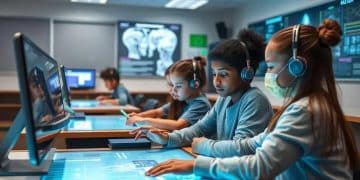AI-driven personalized learning platforms boosting education

AI-driven personalized learning platforms enhance education by tailoring instruction to individual student needs, improving engagement, and leveraging data for better learning outcomes.
AI-driven personalized learning platforms are transforming education in the US, tailoring learning experiences to individual needs. Have you wondered how technology can enhance student outcomes?
Understanding AI-driven personalized learning
Understanding AI-driven personalized learning is crucial for educators looking to improve student engagement and outcomes. In this section, we will explore the key components of these innovative platforms.
What is AI-driven personalized learning?
AI-driven personalized learning uses technology to adapt educational experiences to meet individual student needs. This approach ensures that each learner progresses at their own pace, making education more effective.
Key features of these platforms
Some important features include:
- Adaptive learning pathways
- Real-time feedback and assessments
- Customized content and resources
- Data analytics for tracking progress
The combination of these features creates a unique learning environment tailored for each student. As educators harness the power of AI, they can provide a more engaging curriculum that speaks directly to their students’ strengths and weaknesses.
Moreover, AI can analyze student performance data, allowing teachers to make informed decisions about instructional strategies. This results in a more personalized educational experience that encourages student independence and motivation.
Benefits of AI-driven personalized learning
Implementing AI-driven personalized learning offers several advantages:
- Enhanced engagement and motivation
- Improved learning outcomes
- Better teacher-student interactions
- Development of critical thinking skills
As we dive deeper into this paradigm shift in education, it’s clear that technology empowers both teachers and students. With personalized approaches, learners gain confidence, leading to lifelong success.
Key benefits of these platforms

One of the most exciting aspects of AI-driven personalized learning platforms is the key benefits they offer to both educators and students. These platforms are designed to transform traditional learning methods into more effective, engaging experiences.
Enhanced student engagement
By utilizing technology, these platforms capture students’ attention. Learners can explore topics that interest them at their own pace, making education feel more relevant and interactive.
Improved learning outcomes
Research has shown that personalized learning leads to better academic performance. Students can grasp difficult concepts with tailored support, helping them build a solid foundation for future learning.
Customized learning paths
Each student has unique strengths and weaknesses. Through AI-driven technology, programs adapt to individual needs. Customized learning paths ensure that students focus on areas requiring improvement while advancing in subjects they excel in.
Real-time feedback
Students receive instant feedback on their performance. This immediate input helps them identify their progress and understand where they need to focus their efforts. Teachers can also adjust their strategies based on this data.
Better teacher-student connections
AI platforms free up teachers’ time by automating routine tasks, allowing them to focus on meaningful interactions with students. This fosters stronger relationships and a deeper understanding of student needs.
As a result, AI-driven personalized learning platforms not only benefit students but also empower educators to deliver more tailored and impactful teaching experiences.
Implementation strategies for educators
Implementation strategies for educators using AI-driven personalized learning platforms can transform classrooms and enhance student engagement. It’s essential to understand how to effectively integrate these technologies into the learning environment.
Assessing needs and goals
Before implementing a platform, educators should assess their specific needs and learning goals. Understanding what students require will help tailor the use of technology to improve overall learning experiences.
Training and professional development
Providing adequate training for teachers is crucial. Workshops and ongoing professional development sessions ensure that educators feel comfortable using new tools. When teachers are confident in their abilities, they can better guide their students.
Selecting the right platform
With numerous options available, selecting the right AI-driven learning platform is vital. Educators should consider factors such as:
- User-friendliness
- Customization options
- Support and resources available
- Alignment with curriculum standards
This ensures that the chosen platform meets the unique requirements of their classrooms.
Monitoring and data analysis
Once implemented, ongoing monitoring of the platform’s effectiveness is necessary. Educators should analyze performance data to identify trends and areas for improvement. This helps in making informed decisions about instructional adjustments.
Fostering collaboration and feedback
Encouraging collaboration among teachers can enhance the implementation process. Sharing experiences and strategies enables educators to learn from one another. Additionally, seeking feedback from students can provide insights on how the platform affects their learning.
By applying these strategies, educators can create a dynamic learning environment that leverages the power of AI-driven personalized learning, ultimately leading to improved student outcomes.
Future trends in personalized education

Future trends in personalized education are set to reshape the classroom experience in remarkable ways. As technology evolves, educators and schools can expect to see significant changes that enhance learning outcomes and engagement.
Increased use of artificial intelligence
As artificial intelligence becomes more sophisticated, its role in education will expand. AI can tailor lessons to fit individual learning styles, providing a more customized approach. This means that every student can learn at their own pace, receiving support exactly when they need it.
Emphasis on data-driven decision making
Data will play a vital role in shaping personalized learning. Educators will increasingly rely on analytics to make informed decisions about curriculum and instruction. Analyzing student performance data allows teachers to identify trends and adjust their teaching strategies effectively.
Integration of virtual and augmented reality
Virtual reality (VR) and augmented reality (AR) will offer immersive learning experiences. These technologies can create engaging scenarios where students can explore concepts in 3D. For example, a student can virtually walk through historical events or explore the human body, leading to deeper understanding.
Growth of collaborative learning environments
Personalized education will also promote collaboration among students. Group projects and peer tutoring will allow learners to work together, enhancing their social skills while customizing their educational experience. These collaborative approaches prepare students for future teamwork in the workforce.
The growth of online and hybrid learning models will further support personalized education. Students can choose when and how they learn, balancing their studies with other responsibilities. This flexibility is crucial in today’s world.
As we look toward the future, it’s clear that the landscape of personalized education will continue to evolve, driven by innovation and a commitment to meeting the unique needs of every learner.
AI-driven personalized learning platforms are shaping the future of education. By adapting to students’ unique needs and preferences, these platforms enhance engagement and improve learning outcomes. The integration of new technologies, such as AI and VR, will further revolutionize classroom experiences. As educators embrace these changes, they can create more inclusive and effective learning environments that cater to every student. Ultimately, the future of education looks bright, with endless possibilities for personalized learning.
FAQ – Frequently Asked Questions about AI-driven Personalized Learning
What is AI-driven personalized learning?
AI-driven personalized learning tailors education to meet the specific needs of each student, using technology to adapt lessons and resources.
How can AI enhance student engagement?
AI enhances student engagement by providing customized learning experiences that cater to individual interests and learning styles.
What are the benefits of using data in personalized education?
Using data allows educators to track student progress, identify areas needing improvement, and adjust instruction accordingly to improve learning outcomes.
What future technologies will impact personalized education?
Future technologies like virtual reality and advanced AI will offer immersive learning experiences, making education more engaging and effective.





